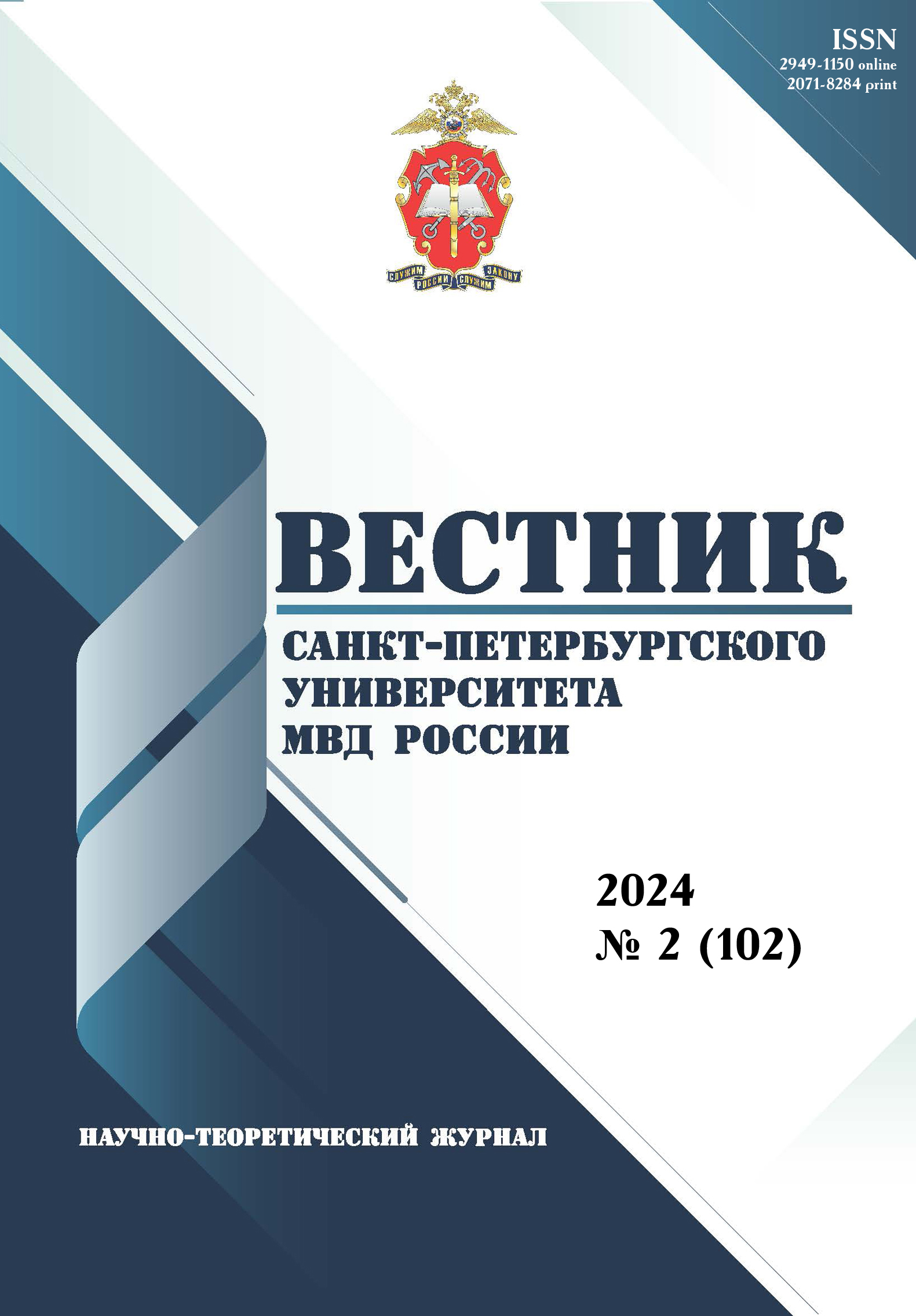UDC 342.56
Introduction. The research is devoted to describing the background, theoretical foundations and results of conceptualisation of the relations of a criminogenic personality to the social environment. The relevance of the concept development is conditioned by the disparate scientific ideas on the relations of a criminogenic personality to the persons and groups forming his/her social environment. The social significance is conditioned by the low efficiency of resocialisation and reintegration of persons repeatedly prosecuted for criminal offences, their increased criminalisation and marginalisation after release from correctional facilities. The research methods are general scientific methods of analysis, synthesis, categorisation, modelling, used to systematise theoretical knowledge in the form of a set of principles and provisions of the concept. The results of the research are the provisions of the structural-functional concept of relations of a criminogenic personality, revealing the importance of social environment for the life activity of a criminogenic personality at different stages of criminalisation, the principles of structuring the social environment on the basis of the provisions of systemic, subjective and psychosocial approaches to the study of personality. The invariant and variant functions of relations to social environment and their significance for the adaptation of a criminogenic personality, formation of his/her self-relationship and complicity in self-realisation are described. The negative role of criminal orientation, worsening the social functioning of a criminogenic personality and contributing to his/her criminalisation, is asserted. The author indicates that the relations of a criminogenic personality from the position of their influence on the social environment can have destructive and constructive forms, which affects the structural characteristics of relations. The possibilities of transformation of relations of a criminogenic personality to social environment are revealed, the grounds for the development of psychological technology are described. In the conclusion the theoretical and methodological perspectives of applying the concept to the study and change of attitudes of criminogenic personality are described.
structural-functional approach, criminogenic personality, criminalisation, resocialisation of convicts, psychology of crime
1. Poznyshev S. V. Kriminal’naya psikhologiya: prestupnyye tipy : O psikhologicheskom issledovanii lichnosti kak sub»yekta povedeniya voobshche i ob izuchenii lichnosti prestupnika v chastnosti. – Moskva: Infra-M, 2020. – 300 s.
2. McCormick T. H. Salganik M. J., Zheng T. How many people do you know? Efficiently estimating personal network size // Journal of the American Statistical Association. – 2010. – № 105 (489). – P. 59–70; https://doi/org/10.1198/jasa.2009.ap08518.
3. Kadushin C. Understanding social networks : Theories, Concepts, and Findings. – New York: Oxford University Press, 2012. – 252 p.
4. Zlokazov K. V. Sotsial’noye prostranstvo v predstavlenii prestupnika : monografiya. – Sankt-Peterburg: Sankt-Peterburgskiy universitet Ministerstva vnutrennikh del Rossiyskoy Federatsii, 2021. – 264 s.
5. Kovchina N. V., Ignatova V. V. Mezhdistsiplinarnyy analiz fenomena «sotsial’noye vzaimodeystviye» // Sovremennyye problemy nauki i obrazovaniya. – 2014. – № 3. – S. 240.
6. Tangney J. P., Stuewig J. B., Hafez L. Shame, guilt, and remorse: implications for offender populations // The Journal of Forensic Psychiatry & Psychology. – 2011. – No. 22 (5). – P. 706–723; https://doi/org/10.1080/14789949.2011.617541.
7. Asencio E. K., Burke P. J. Does incarceration change the criminal identity? A synthesis of labeling and identity theory perspectives on identity change // Sociological Perspectives. – 2011. – Vol. 54. – No. 2. – P. 163–182; https://doi/org/10.1525/sop.2011.54.2.163.
8. Zwecker N. A., Harrison A. J., Welty L. J., Teplin L. A., Abram K. M. Social Support Networks among Delinquent Youth: An 8-Year Follow-up Study // Journal of offender rehabilitation. – 2018. – № 57 (7). – P. 459–480; https://doi/org/10.1080/10509674.2018.1523821.
9. Zlokazov K. V. Samootnosheniye i sotsial’noye vzaimodeystviye prestupnika: effekt sopryazheniya / Psikhologiya segodnya: aktual’nyye issledovaniya i perspektivy : materialy Vserossiyskogo psikhologicheskogo foruma : v 2 t., 28–30 sentyabrya 2022 g. – Yekaterinburg: Izdatel’stvo Ural’skogo universiteta, 2022. – T. 1. – C. 312–315. – URL: http://elar.urfu.ru/handle/10995/117708.
10. Zlokazov K. V. Sotsial’noye okruzheniye lichnosti i yego vliyaniye na prestupnoye povedeniye // Prikladnaya psikhologiya i pedagogika : setevoye izdaniye. – 2022. – T. 7. – № 3. – S. 127–139; https://doi/org/10.12737/2500-0543-2022-7-3-127-139. – URL: https://naukaru.ru/ru/nauka/article/51135/view.
11. Sobchik L. N. Kriminal’nyye naklonnosti i psikhodiagnostika // Psikhologiya i pravo. – 2017. – T. 7. – № 1. – S. 131–143; https://doi/org/10.17759/psylaw.2017070111.
12. Kozhevnikova Ye. N. Aksenova G. I., Kirillova T. V. Zhiznennyye strategii uslovno osuzhdennykh nesovershennoletnikh : monografiya. – Moskva: Prospekt, 2017. – 136 s.
13. Lomov B. F. O sistemnom podkhode v psikhologii // Voprosy psikhologii. – 1975. – № 2. – S. 31–45.
14. Barabanshchikov V. A. Sistemnoye issledovaniye psikhiki // Vestnik Rossiyskogo universiteta druzhby narodov. Seriya: Psikhologiya i pedagogika. – 2007. – № 1. – S. 8–19.
15. Zlokazov K. V. Strukturno-funktsional’naya model’ otnosheniy kriminogennoy lichnosti k sotsial’nomu okruzheniyu // Prikladnaya psikhologiya i pedagogika : setevoye izdaniye. – 2023. – T. 8. – № 4. – S. 22–29; https://doi/org/10.12737/2500-0543-2023-8-4-22-29. – URL: https://naukaru.ru/ru/nauka/article/71377/view.
16. Karpov A. V. Strukturno-funktsional’naya organizatsiya protsessov prinyatiya gruppovykh resheniy // Voprosy psikhologii. – 2004. – № 1. – S. 126–136.
17. Abul’khanova-Slavskaya K. A. Psikhologiya i soznaniye lichnosti : (Problemy metodologii, teorii i issledovaniya real’noy lichnosti) : Izbrannyye psikhologicheskiye trudy. – Moskva: Moskovskiy psikhologo-sotsial’nyy institut, 1999. – 216 s.
18. Il’in V. A. Bonkalo S. V. Fenomen brodyazhnichestva s tochki zreniya psikhosotsial’noy teorii razvitiya: priroda, sushchnost’, oriyentiry profilaktiki // Sotsial’naya psikhologiya i obshchestvo. – 2015. – T. 6. – № 3. – S. 150–156; https://doi/org/10.17759/sps.2015060311.
19. Buryy V. Ye., Stepanenko V. I. Osobennosti organizatsii ispravitel’nogo protsessa osuzhdennykh v mestakh lisheniya svobody : monografiya. – Mogilev: Mogilevskiy institut MVD Respubliki Belarus’, 2017. – 164 s.
















